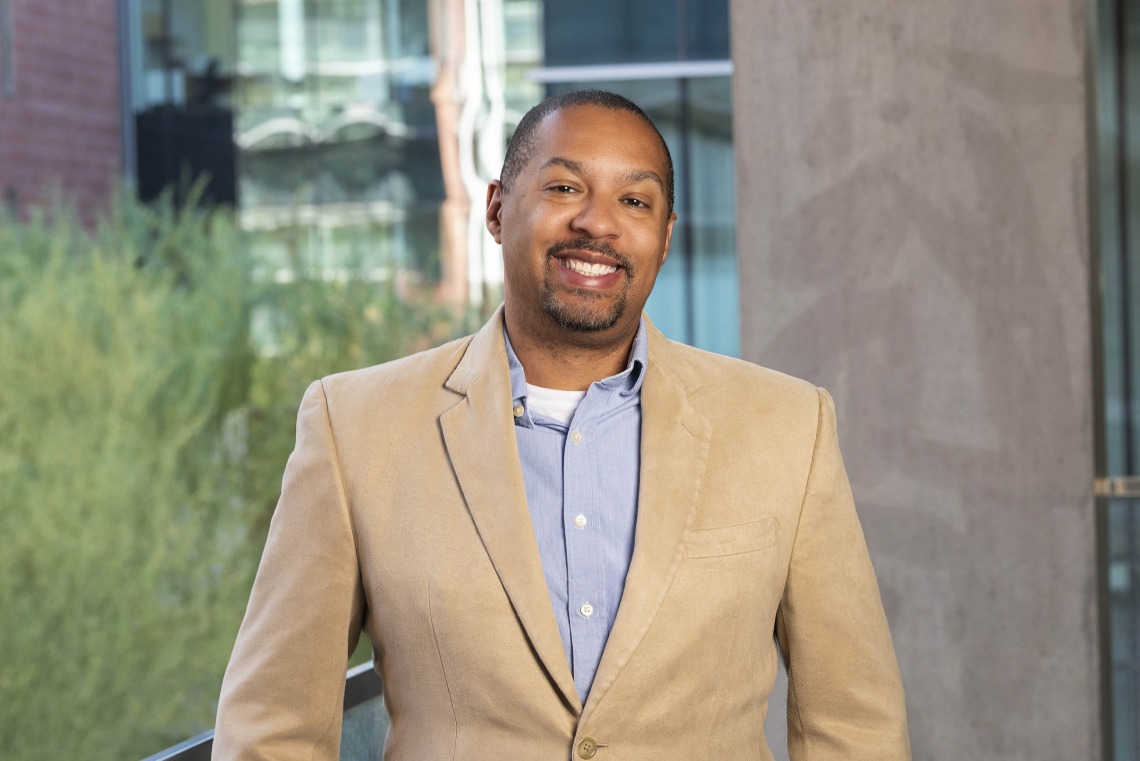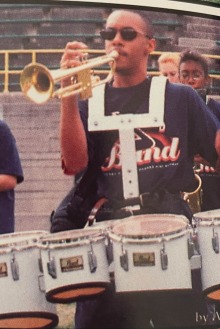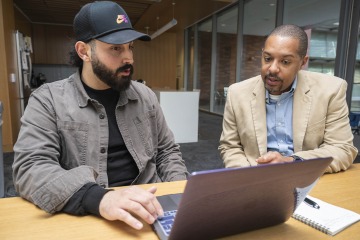College of Medicine – Tucson’s Michael D.L. Johnson doesn’t miss a beat as a dedicated scientist who inspires the next generation of researchers.

Michael D.L. Johnson, PhD, runs a lab that examines how bacteria interact with metals during infections and is dedicated to inspiring others to fall in love with science.
Michael D.L. Johnson, PhD, has a heck of an icebreaker when he meets new people.
“I usually start with ‘three truths and a lie,’” said Johnson, an associate professor in the University of Arizona College of Medicine – Tucson’s Department of Immunobiology. “They already know that I’m a scientist, so I say I majored in biochemistry, I thought I almost killed Shania Twain at a concert, I delivered my second child, and I don’t like beans.
“Which one of those four things is the lie? It’s hard for them to pick because all of them sound crazy. The one that doesn’t sound crazy is actually the lie.”
Johnson, who runs a laboratory that examines how bacteria interact with metals during infections — “Killin’ it with copper,” as he calls it — played trumpet and drums when he majored in music as an undergraduate at Duke University. He decided to study what he loved and figure out a career path later.
He did deliver his second daughter, who made her grand entrance into the world at the exact moment the midwife was getting something from her car. “Babies are extremely slippery,” he noted.
He may have been a tad dramatic describing the Shania Twain incident. He accidentally tossed a drumstick into the air when he and the rest of his high school drumline played backup on a song at the country singer’s 1999 concert in Chicago. The drumstick was black. The floor was black. And all he could imagine was her tripping over it. Instead, the drumstick rolled harmlessly backward.

Michael D.L. Johnson played trumpet and drums in high school – he even backed country singer Shania Twain at a local concert – and decided to study music as an undergraduate at Duke University. (Yearbook photo courtesy Michael D.L. Johnson).
“It was like time stopped in that moment,” said Johnson, who is also a member of the BIO5 Institute.
Johnson really does hate beans. “It’s a texture thing,” he said.
If you couldn’t tell already, there really is a lot to Johnson beyond research.
Influencing others
Jennifer Kehlet Barton, PhD, director of BIO5, calls Johnson amazing. He is the inaugural holder of the Keating Family Endowed Professorship for Interdisciplinary Research at the institute. At his induction ceremony earlier this year, Barton said, “Michael has an infectious optimism that encourages everyone around him to be better researchers and better human beings.”
In 2020, Cell Mentor named him one of 100 inspiring Black scientists in America, and he made a repeat appearance in its 2021 list of 1,000 inspiring Black scientists. Barton praised Johnson’s research, but that’s just the beginning of his impact. Johnson, the associate dean for basic science research and graduate studies for the College of Medicine – Tucson, cares deeply about sparking a love of science in others and making sure opportunities are available to everyone.
To that end, he created a postdoctoral fellowship program to offer mentoring and professional development at BIO5. He also started the National Summer Undergraduate Research Project, which provides virtual research opportunities to Black, Indigenous and people of color, and Latinx undergraduate students in the fields of microbiology, immunology and cancer.
It's his way to give back after he, too, felt supported in his early life.
“There were a lot of people who had to pour into my life to be able to get me from Point A to Point B to Point C to Point D. They helped me realize how valuable I could be to a room even if I wasn’t the smartest person there,” he said.
Finding a way to contribute
Johnson, the only child of a single mother, grew up in inner city Chicago. His mother kept him busy, signing him up for baseball, roller skating, swimming, music lessons and bowling. He was the city bowling champion his junior year of high school.

Michael D.L. Johnson takes mentoring seriously – he created a postdoctoral fellowship program along with the National Summer Undergraduate Research Project to support future scientists. Fadi Sayegh, a graduate student in Molecular Medicine in Johnson’s lab, meets with him.
Fun fact: He attended top-rated Whitney M. Young High School, the same school as former First Lady Michelle Obama. It was there, surrounded by overachievers, that Johnson learned a valuable life lesson.
“You don’t have to be the smartest in the room, but you do need to have something to offer,” he said. “There are going to be more talented musicians out there. There are going to be better bowlers. There are going to be better people doing everything. But it doesn’t mean that I have less to contribute to those particular situations or those environments. I can still find a way to contribute.”
While music was a passion Johnson pursued as an undergraduate, he planned to become a veterinarian. Then he ended up overwhelmed, overscheduled and with a D in organic chemistry.
“I had that mentality that I did everything in high school; so, I can do everything in college,” said Johnson, director of graduate studies for the UArizona Applied Biosciences Industrial Microbial Biotechnology Track. “But, no, you can’t. Things are harder.”
After some tutoring, Johnson discovered he was actually good at chemistry and ended up being a tutor himself. He also realized he no longer wanted to be a vet. He found a new path his senior year, when he was in church with his then-girlfriend/now wife, Elisha, and had a spiritual epiphany about his future – that he should study pharmacology.
“People have problems trying to put God and science in the same room,” said Johnson, who was raised Catholic. “I think there’s a lot of animosity between the two, but I think a lot of that is just politicized.
“We’re getting bogged down in the minutia instead of saying, let’s see how we can use science and faith to make the world a better place. If you’re so concentrated on the fact that they’re at war with each other, then you miss out on all the possibilities that they have to coexist.”
Life coach in a lab coat
Before Johnson joined UArizona in 2016, he worked in the departments of infectious disease and immunology at St. Jude Children’s Research Hospital in Memphis, Tennessee. There, he created a podcast of interviews with researchers that middle and high school teachers could use to supplement their science lessons. He launched Black Science Blog to simplify the subject for the public.
A desire to make science and opportunities in the field accessible to everyone drove him to start the National Summer Undergraduate Research Project at the height of the COVID-19 pandemic. The program matches underrepresented undergraduate students with mentors across the country to provide valuable, virtual summer research experiences. In 2021, the American Society of Microbiologists awarded Johnson its William A. Hinton Award for Advancement of a Diverse Community of Microbiologists through NSURP.
NSURP was a game-changer for Noriko Bracken.
“You don’t have to be the smartest in the room, but you do need to have something to offer.”
Michael D.L. Johnson
Last year, as a senior at the University of Nebraska at Omaha, Bracken was majoring in molecular and biomedical biology and had limited research opportunities. She figured she’d end up as a line scientist doing quality control in the food industry.
Bracken, one of the first in her family to go to college, said she didn’t think graduate school was even possible and credits Johnson and NSURP for changing her career trajectory. She remembers a tearful conversation with him when she felt stressed and completely unprepared.
“He said that I needed to have the faith that he and the other leadership had in my capacities to be a successful scientist,” said Bracken, who is at Yale University working on a doctorate in molecular and biomedical biology with a track in molecular biotechnology. “Dr. Johnson really helps students view themselves as the scientists that they want to be, and it’s not hype and fakeness. It’s him investing resources; time; selecting people to come and talk to you; and making sure that you are fully prepared.”
Because of her experience with NSURP, Bracken said she intends to mentor students one day.
“This type of mentoring is just so rare in itself, where it’s palpable that someone cares about your future,” she said.
That’s music to Johnson’s ears.
“I want people to say that not only was he a good scientist, he loves bringing people together. He loves sharing ideas. He loves bringing people with big ideas together. He loves giving people opportunity,” Johnson said. “That’s what I would really like my legacy to be."
Immunobiologist’s impact reaches far beyond the lab | The University of Arizona Health Sciences

